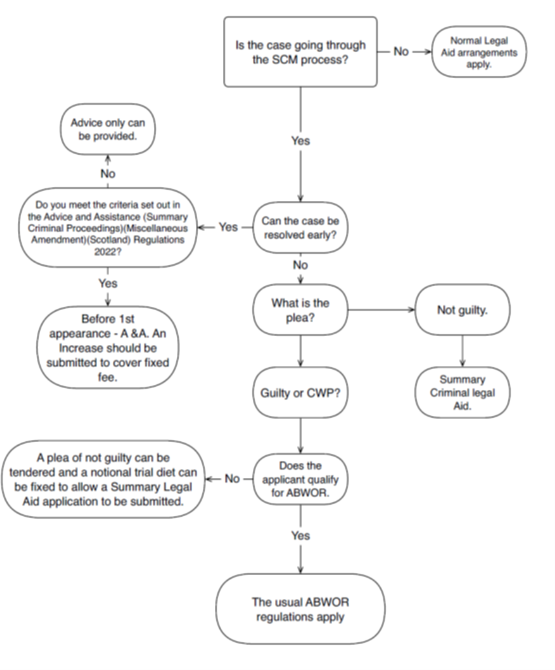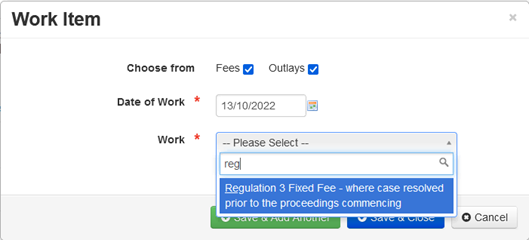
https://www.slab.org.uk/guidance/legal-aid-arrangements-for-summary-case-management-cases/
https://www.slab.org.uk/guidance/legal-aid-arrangements-for-summary-case-management-cases/
The current system of summary criminal legal assistance (ABWOR for guilty pleas and cases continued without plea), and Summary Criminal Legal aid following a not guilty plea can still be used for cases in the new Summary Case Management process.
Appointed Solicitor ABWOR can still be used for custody cases, with summary ABWOR for non-custody cases.
All these types of assistance have the £572 fixed fee.
Some new arrangements were introduced in November 2022 to allow the fixed fee to be paid in cases which were resolved before the first court appearance.
It was also agreed that a new process of Notional Trial Diets could be used for clients who did not qualify for ABWOR, but did qualify for Summary Criminal Legal Aid, to allow assistance to be provided.
Fixed Fee (£572):
The A&A/ABWOR changes introduced in November 2022 for the Summary Case Management pilots in Dundee, Hamilton and Paisley, and subsequently in Glasgow and Perth, can also be used across the country.
These changes were made to support the pilot cases where the Crown are disclosing more information to the defence at the start of cases to help encourage earlier resolution.
As soon as the Crown receives key information, they will disclose it to the solicitor, provided they have received a Letter of Engagement confirming that they are acting in the case.
In some instances, this may even be before the Crown has formally issued the complaint.
The legal aid changes allow SLAB to pay the Summary fixed fee to solicitors in cases, which could be resolved at the early stages without a court appearance.
The Advice and Assistance (Summary Criminal Proceedings) (Miscellaneous Amendment) (Scotland) Regulations 2022 came into force on 4 November 2022 and apply across the country.
These changes allow SLAB to pay the fixed fee of £572.00 under Advice and Assistance or ABWOR prior to the first court appearance, once the Crown has issued a complaint, or where it has decided to prosecute the case and the solicitor has confirmed they are acting in the case, before the complaint is formally issued.
The initial Expenditure limit for these cases is £600.
If the case does not have a court appearance, there is A&A where subject to the conditions as specified in regulation 17 (1B) of the Advice and Assistance (Scotland) Regulations 1996 are met then the fee prescribed (£572.00) is payable.
There is also the ABWOR provision which allows cited cases to be charged under regulation 6(1)(c) of the Advice and Assistance (Assistance by Way of Representation) (Scotland) Regulations 2003.
Regulation 6(1)(c)(iii) is payable where “prior to calling the case at that diet the prosecutor accepts a plea of not guilty to the charges or otherwise makes a final determination that the case is not to proceed whether at that time or thereafter and does not call the case at that diet” so the fixed fee can be paid where there is no actual court appearance.
Under regulation 17(1B), the following criteria must be met:
In addition, regulation 17(1B) (c) (a) sets out the following payment arrangements if you are acting for more than one client in the same case and all conclude on the same basis at these early stages:
Details on how to apply for and claim payment for these early resolution cases is included at section How to apply for Advice & Assistance or ABWOR for early resolution cases below.
If you satisfy the usual Appointed Solicitor arrangements and have had a prior solicitor/client relationship with the accused, you can apply for ABWOR in the usual way.
If you do not meet these arrangements, or if the client is not financially eligible for ABWOR (but would qualify under the Summary Criminal undue hardship test, please see section Notional trial diets below.
You can apply for Summary Criminal Legal aid after the Not Guilty plea has been tendered, in the usual way.
The different financial eligibility tests for Criminal ABWOR (Keycard) and Summary Criminal (Undue Hardship) mean that there will be some clients who would not qualify for ABWOR (or would qualify with a contribution), but would qualify for Summary Criminal Legal Aid, which has no client contributions.
Based on data from 2019, we estimated that 7.7% of summary criminal cases would not have qualified for ABWOR.
Although the initial threshold for weekly disposable income is lower in summary criminal (£222 as opposed to £245), the ability to deduct essential household outgoings such as rent/mortgage, council tax, loan repayments etc. means that more applicants can become eligible under the undue hardship test.
In Criminal ABWOR cases, the only deductions which can be made from net weekly income are the allowances for partners and dependents, and any maintenance payments being made.
These items are also deducted in the summary criminal undue hardship test.
An additional 8.4% of cases would have fallen in the disposable income range of £105 to £245. Therefore, these cases would have had a contribution under the A&A/ABWOR Keycard assessment.
This leaves 83.9% of all cases where the clients would have been eligible for both Summary Criminal Legal aid and ABWOR, with no contribution to pay.
In the SCM courts, where the Defence indicates that the client does not qualify for ABWOR, either on financial grounds, or where the ABWOR criteria are not met, a plea of not guilty can be tendered.
Rather than set an intermediate diet and trial diet, a Notional Trial Diet will be fixed for up to three weeks’ time for domestic cases, and up to four weeks for non-domestic cases.
Witnesses will not be cited at this stage, but this allows you to submit an application for summary criminal legal aid to SLAB, with proof of the applicant’s income and household outgoings where appropriate, to confirm eligibility.
At the Notional Trial Diet, the case will initially follow the same process as a case, which has been continued without plea.
This process can also be used where ABWOR cannot be granted for any other reason, for example, in a custody case, there is no prior relationship with the client to satisfy the Appointed Solicitor criteria.

You can use the current online system for submitting Advice and Assistance or ABWOR applications for cases, which have been resolved before the commencement of proceedings (A&A) or before the first court appearance (ABWOR).
How to apply for A&A for early resolution cases
For any cases, which have resolved before the commencement of formal proceedings, you can admit your client to Advice and Assistance in the usual way, applying the usual financial eligibility test.
You should also submit an increase in authorised expenditure to £600 to allow the fixed fee to be paid under the grant of advice and assistance.
In the increase details section of this, you should explain the circumstances, which have led to the resolution of the case before the proceedings, have commenced.
As the regulations allow for a £600 expenditure limit for these cases, the increase will be ‘granted’ from the effective date of the grant of Advice and Assistance.
On obtaining the appropriate increase in expenditure, you should access the on-line account in the normal manner and proceed to the work breakdown tab.
On selecting Add Work Item, you can then scroll/search for the new fee entitled Regulation 3 Fixed Fee – where case resolved prior to the proceedings commencing as shown in following screenshot:

It is then optional to provide further supporting detail:

On clicking Save & Close, the fee will be generated:

You can then submit your claim in the normal manner.
For any cases which have resolved after commencement of formal proceedings, but before the first court appearance, you can admit your client to Criminal ABWOR in the usual way, applying the usual financial eligibility test.
You can enter the date when any initial or advanced copy of the complaint was sent to you in the question ‘Date of commencement of proceedings (date on which the complaint was served)’.
You should:
